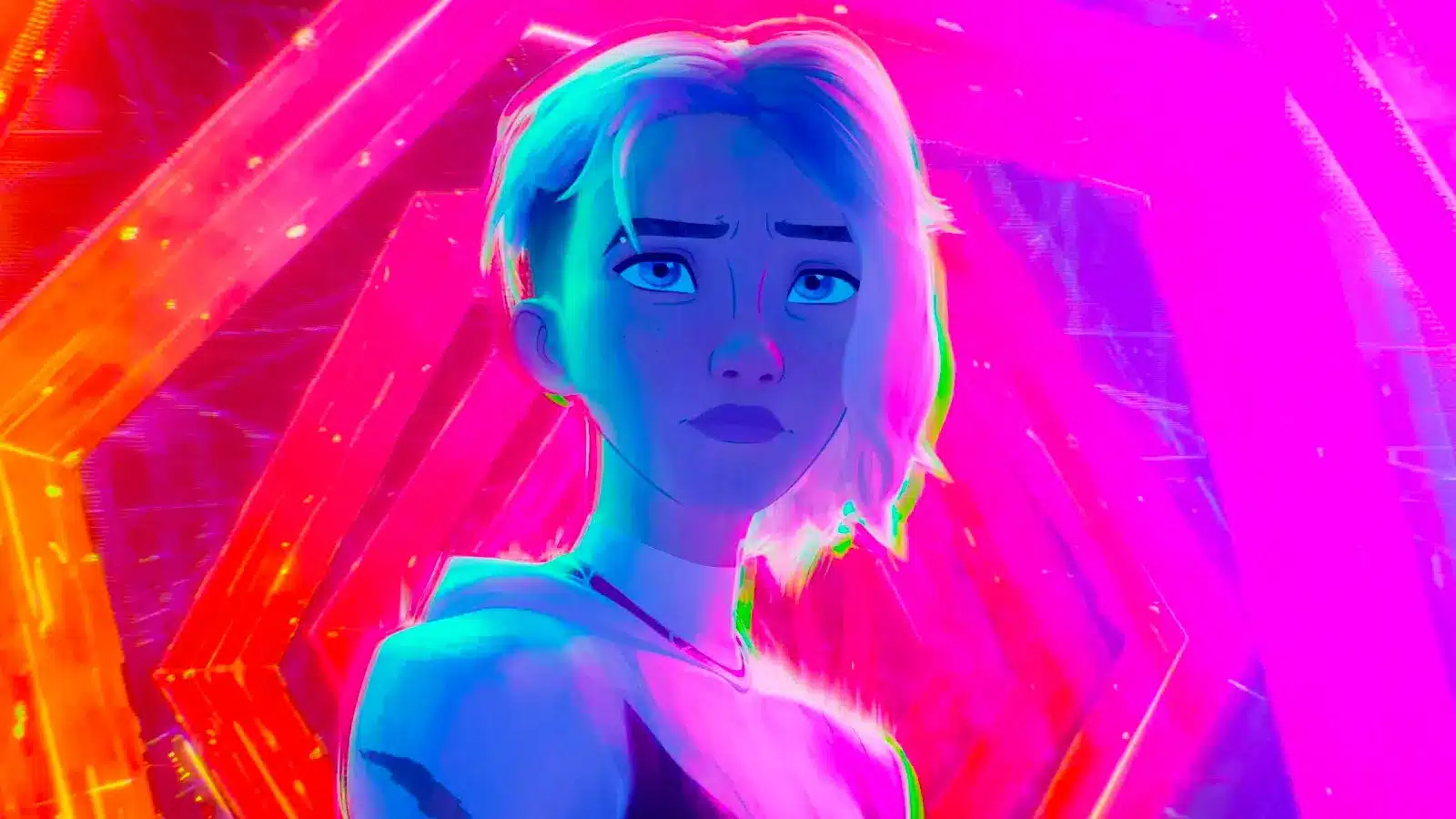Ever since I saw Across the Spider-Verse, I’ve been really interested in the journey that Gwen Stacy undergoes in the film. I’ve already talked about the hubris of Miles, Miguel, and even the Spot, and how this is a core thematic element of the story – but Gwen’s very much got her own thing going on. So I figured I’d try and break it down a little here, with the help of one Joseph Campbell and a certain infamous narrative template – but I’m getting ahead of myself.
A central plot point of Across the Spider-Verse is the idea of ‘canon events’, events which shape a Spider-Person into the hero they are meant to be, regardless of the world in which they live. Setting aside the dubious veracity of whether Miguel is even right about canon events, it’s well worth examining the very beginning of the film, as we learn more about the events that helped shape Gwen Stacy into her world’s Spider-Woman.
For seemingly every Spider-Person, one canon event seems to be the significant death of someone close to them, near the beginning of their Spider-Career. For Miles, it is Aaron Davies, the Prowler. For innumerable Peters, an uncle Ben. And for Gwen herself, Peter Parker, monstrously transformed and killed in the ensuing devastation of a battle.
It’s fitting, given Gwen’s raised prominence in this film, to grant her a little more backstory, to help her assume the narrative weight that comes with being (I think) the film’s co-protagonist. Yet it also serves a very important function – to illustrate that while Gwen may be Miles’ equal in the film, she is, in many ways, less heroically developed.
This may seem an odd claim, but consider the deaths of Aaron Davies and Peter Parker. In many significant ways, the deaths are very similar. Both the Prowler and the Lizard are villainous and dangerous figures, both of them die fighting Spider-(Wo)man (though through no direct fault of the hero), and both of them die in the arms of their Spider-Person.
But there’s one huge difference, too, and that difference is all the more important given the other similarities. The last words Peter Parker ever hears are his best friend lying to him. He knows Gwen is Spider-Woman, and says so to her – only to be met with rejection, with dishonesty, with Gwen’s mask still up (figuratively and literally). Where Miles and Aaron share a final touching moment of reconciliation and honesty, Peter reaches out for just such a moment – only to be rejected by Gwen. The very last words Peter hears are his best friend, lying to him, even though he knows the truth.

This early character beat is important because it shows that Gwen, for all her heroic trappings, is not yet a hero. Don’t get me wrong, she is undoubtedly heroic, as well as being skilful and practised. But I don’t think she’s a hero…not yet, anyway. Because for all her heroism, she has not learnt to confront true danger, dangers to herself – whenever such a challenge is presented to her, she lies. She runs away. She does everything she can to avoid confrontation, no matter how necessary or justified that confrontation may be. She lies to Peter to protect herself.
There’s another, much smaller moment, also towards the beginning of the film, which should clue us the audience in to just how far Gwen still has to go – when her father gets called to the Guggenheim, his last words to her are, “I’ll call later – love you!”
And Gwen doesn’t respond. Of course, this is developing her fractious and complicated dual relationship with Captain George Stacy, father and vigilante hunter – but it’s also an incredibly clear call back to the first film, and to Miles’ relationship with his own father. Twice, Jeff says “I love you” to Miles. The first time it’s played for a joke, with Miles eventually (and very unwillingly) responding, but this sets up the pathos of the second time. This time, Miles does not respond, and Jeff does not expect him to – but it is only because Miles is gagged and webbed down, unable to react at all.
Then, following the film’s climax, Miles as Spider-Man tells Jeff that he loves him – disguised, to be sure, but of his own volition, unafraid of his own emotional vulnerability. It’s simultaneously funny and touching, and illustrates the growth of Miles…growth that Gwen, despite her seniority, has not yet experienced. Miles has become a hero in ways that Gwen has not managed…yet. And Miles’ courage and vulnerability are demonstrated through his relationships with Aaron and Jeff in the first film; relationships that are contrasted with Gwen’s fear and dishonesty when confronted by Peter and George.
Gwen’s story and arc in AtSV really fascinated me, and it took me a couple of viewings to really notice just how clever it is. Because (spoilers) Gwen does overcome her own fears and insecurities, of course, but the way in which she does so, and the story the film gives her, is really interesting, and strangely fitting. Because Gwen has the facade of being a hero, she is also given the facade of a hero’s journey – of the hero’s journey.
Prologue: The Monomyth
The Hero with a Thousand Faces, Joseph Campbell’s 1949 work of comparative analysis in mythology, is arguably the best-known piece of narrative theory today. Popularised by George Lucas’ conscious aping of the “hero’s adventure” in Star Wars, the idea of the monomyth, the call to adventure, and other concepts defined by Campbell are generally familiar to anyone with an interest in narrative and myth (though whether one finds Campbell’s ideas credible or useful is a very different question).
Naturally, anyone working as a writer or director is likely to be very familiar with the work – and I think that’s very apparent in AtSV, especially in how the film portrays the hero’s journey as seen through Campbell. Because Gwen’s story is very consciously Campbellian, but in a way that is distinctly contrary to Campbell’s underpinning ideas. Gwen, in a way, undergoes an anti hero’s journey.
Into the Spider-Verse also adheres closely to the monomyth, of course. Miles is living a normal life, is bitten by a magic radioactive spider and drawn into an extraordinary world. He is unwilling and nervous, but through the aid of several mentors, he is able to overcome obstacles, up to and including a ‘death’ (when he is left behind by the other Spider-people) and ‘resurrection’ (as his own spin on the heroic Spider-Man). With his new gifts, he returns to his own world, having overcome the final tests, and is now present in both worlds at once, and to the betterment of both.
Super monomyth-ish, but that’s the point of the monomyth – there isn’t necessarily much more for me to say. The sequel, on the other hand, also draws inspiration from the hero’s journey, in (what I think) is a much more deliberate manner, and in an actively subversive way.
Departure
Consider the opening of the film. From the beginning, we’re being told two different things in the film’s language. The narrative, Gwen’s narrative, is framing Miles as being the hero – yet the actual framing of the film makes it clear that this story is also Gwen’s. The narration is hers, the film opens with her – even her words make it clear that this is no longer just Miles’ story.
Gwen: Let’s do things differently this time. So differently. His name is Miles Morales. He was bitten by a radioactive spider. And he’s not the only one. He hasn’t always had it easy. And he’s not the only one. And now he’s on his own. And he’s not the only one. You think you know the rest; you don’t. I thought I knew the rest, but I didn’t. I didn’t want to hurt him, but I did. And he’s not the only one.
Consider the first clear and inarguable monomythic moment in the film, the ‘call to adventure’ that Gwen receives from Miguel O’Hara and Jessica Drew. The Hero with a Thousand Faces is a work that deals with symbolism and interpretation, yet here every Campbellian element is nearly as literal as possible. There is a talisman – the wrist-worn device that allows safe passage into the beyond. There is a threshold, the multiversal portal, guarded by Miguel, that will lead to an extraordinary world. With the aid of Jessica, Gwen is granted passage, and steps through the threshold into adventure.
This all fits the monomyth incredibly clearly – yet it does not tell the whole story, either. Because the film frames this moment not as a triumph, but as a tragedy. The music is ominous, throbbing, doom-laden – it has a bombastic veneer, yet is clearly tragic. Gwen isn’t embracing the call to adventure, she is fleeing her responsibility as a superhero and as a daughter. And as we later learn, the narrative logic of the film emphasises that this is the wrong choice on Gwen’s part, because Miguel’s organisation is not at all heroic. Gwen isn’t even making the right choice for the wrong reasons here, she’s also making the wrong choice.
Gwen’s acceptance of the call in this moment isn’t a moment of excitement, because Gwen’s not starting on her hero’s journey – she’s running away, rejecting the responsibility that is entailed by being a hero. The threshold may meet the definition of Campbell’s structure, but it does not in any way match the spirit of his theory. Gwen doesn’t want to travel the multiverse for the sake of adventure, or because it is right – she wants to do so because it would be easier than her real world, which goes against the core of Campbell’s template.
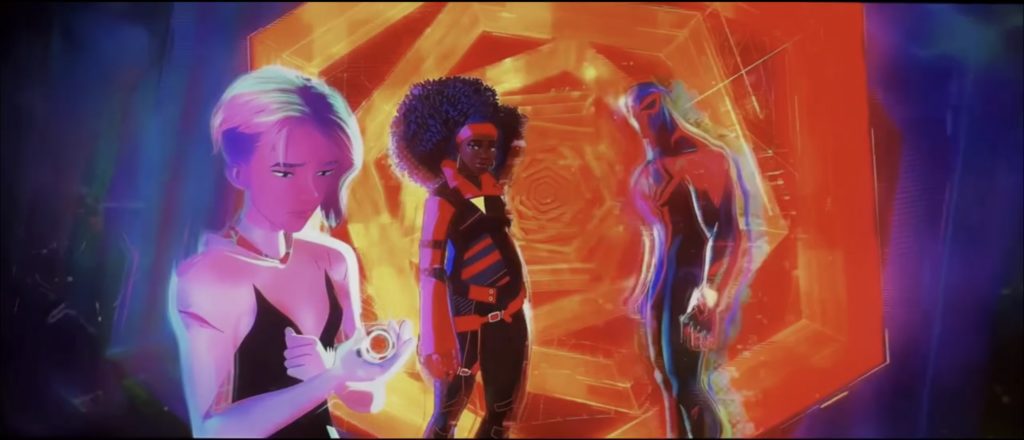
So Gwen steps through on her “hero’s journey”, having been granted a multiverse-watch by Miguel (as mentioned above, a clear talisman in Campbellian language), and then…vanishes. Right at the moment when she enters the new world, when she crosses the first threshold, the film leaves her, instead focusing on Miles. At this point in Campbell’s monomyth, we ought to be in the “Belly of the Whale”, to see Gwen undergoing her first trials. But this isn’t really Gwen’s hero’s journey at all, and so we cut away from her, undercutting her threshold crossing (and, arguably, foreshadowing that Miles himself is a key element in Gwen’s trials ahead).
Initiation
Gwen, though, is blissfully unaware for the moment, she seems to truly believe that she is on a heroic path. When she reappears in the film and is chatting with Miles, she enthusiastically talks about Miguel and Jess, outright saying that she’s “learned so much” from the senior Spider-Woman. Jessica Drew is, in this twisted hero’s journey, Gwen’s mentor.
But what exactly has Gwen learnt from Jessica? Don’t get me wrong, I don’t doubt that from a literalist perspective, Gwen is telling the truth, that she has learnt lots of cool little tricks and ideas from Jessica. But from a narrative perspective, we never see any evidence of this, explicit or implicit. Gwen does not show herself to have developed greatly as a superhero in any aspect, whether mental, physical or even moral. She does not pull off some amazing Jessica-style move to save the day, she doesn’t call upon Jessica’s influence to solve a crisis. From a story-logic perspective, Gwen has not developed in the slightest through Jessica’s mentoring.
Further, when Jessica herself reenters the film, as a hologram call while Gwen is investigating the Spot’s apartment, we see no evidence of warmth or camaraderie from her. Indeed, Jessica’s appearance is framed as being something threatening, looming suddenly over Gwen from behind, and scolding her for her failures. Jessica isn’t shown as being a figure who cares for Gwen, or is trying to help her – she’s scary, dispassionate, judgemental.
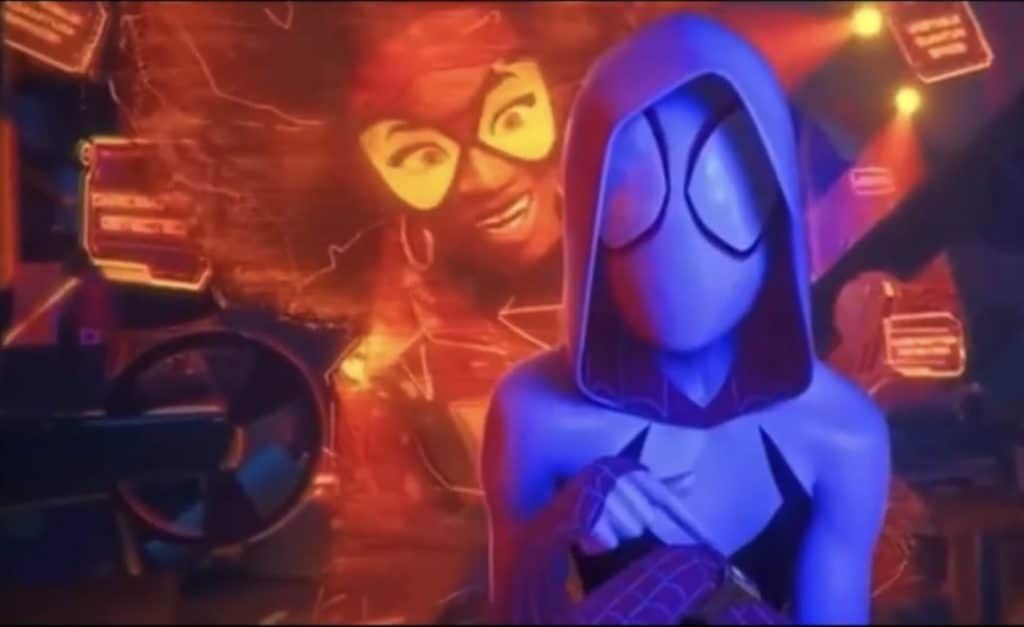
Jessica is framed as being Gwen’s mentor, yet she does a spectacularly bad job at it – nominally she is indeed a mentor, but narratively she does nothing to earn it (and, as will be seen later, actively fails to live up to the tag).
So Gwen runs away, again, ostensibly living up to her duty by chasing the Spot, whilst failing in her duty to Miles. And in a way, I think Gwen is aware that she is turning her back on a friend without just cause, as she looks out over Miles’ New York and farewells him, unaware that he’s right there.
Gwen: Goodbye, Miles.
At this point, Gwen is on her Road of Trials, and, well…she doesn’t do a very good job with any of those trials, to be honest. Having run away from Miles, she continues to mislead Miles on what she has been told about him. When Captain Singh is in danger, Gwen upholds Miguel’s status quo instead of saving him, and is clearly conflicted after Miles manages to save him. Hobie outright tells Gwen that Miles needs to be enlightened, and still Gwen refuses to act. In short, despite being a protagonist overall, Gwen does very little (arguably nothing) in this act of the film – she is impotent, unwilling, afraid. Far from learning and growing, from seizing her own fate and confronting danger, Gwen is repeating the mistakes she has made since the beginning of the film.
Tellingly, Gwen makes it clear that she has not returned to her home in months, remaining either with the Spider-Society, or ‘crashing’ in various alternative dimensions, including Hobie’s. The film does not make it clear how exactly the Spider-Society functions, though given that Peter B Parker seems to view it as being ‘work’, as a day job, I am sure that members are somewhat free to come and go as they will. Nonetheless, given the rhetoric around how Miguel and the Society have lost sight of their goals, there is a very real implication that the Spider-Society is inadvertently preventing Spider-People from realising their own heroic destinies in their own universes.
The five months that Gwen spends with the Society are five long months that her own home is unprotected by Spider-Woman…and even in the cases of Peter B and Pavitr, who clearly still live and are active in their home dimensions, they cannot be present in the Society, in their civilian lives, and as their home’s hero all at the same time. The Spider-Society may be doing ‘the greater good’ (an infamously problematic phrase), but it does so at the cost of thousands of ‘friendly neighbourhood Spider-People’. But this is an issue not fully dealt with in the film, though it would not surprise me if the sequel returns to it.
Though the story centres around Miles and Miguel during the central act centring around the Spider-Society, there’s one little moment from Gwen that I want to highlight while she (acting alongside the literally faceless and seemingly unthinking horde of Spider-People) chases Miles. Gwen, as she leaps and swings after Miles, finally begins to express her doubts:
Gwen: But my gut says…
Jessica: Then use your head!
Again, Jessica is nominally Gwen’s mentor – but she’s actively holding Gwen back, and preventing Gwen from pursuing the right course of action. And, of course, this results in catastrophe – Miles escapes, and as he does so, he turns his back on Gwen, finally confirming the words she said to him just a few hours earlier, and (to drive the point home) turning invisible immediately after, just as he was when Gwen herself left him behind:
Miles: Goodbye, Gwen.
Return
So Miles escapes into another universe, and now the film’s attention swings back to Gwen, as she faces the consequences and sum of everything she’s done wrong. There’s a bitter irony, too, in that the figure judging her – Miguel – is not only complicit, but arguably bears even more responsibility than Gwen. Miguel told Gwen to hide the truth from Miles, and assigned her to deal with the Spot; and even at the last, Miguel failed to apprehend Miles (which is the actual excuse Miguel uses for expelling Gwen). Miguel is at least as responsible, if not more so, for all of this – his vicious judgement of Gwen is thus completely unfair.
But that doesn’t make it untrue, and I think Gwen is aware of both these things in this moment. So she looks to her mentor, to Jessica Drew, for any sort of support or guidance – and Jessica rejects her, fails her. In the moment when Gwen most needed a mentor and an advocate, Jessica proves herself to be neither – and so Gwen dies.
Well, she doesn’t die die, of course, she’s still alive. But she is dead to the Spider-Society, dead to Miguel, executed and banished from the supernatural world. Spiritually and symbolically, this is Gwen’s death, and it is every bit as meaningful as if she had actually been killed.
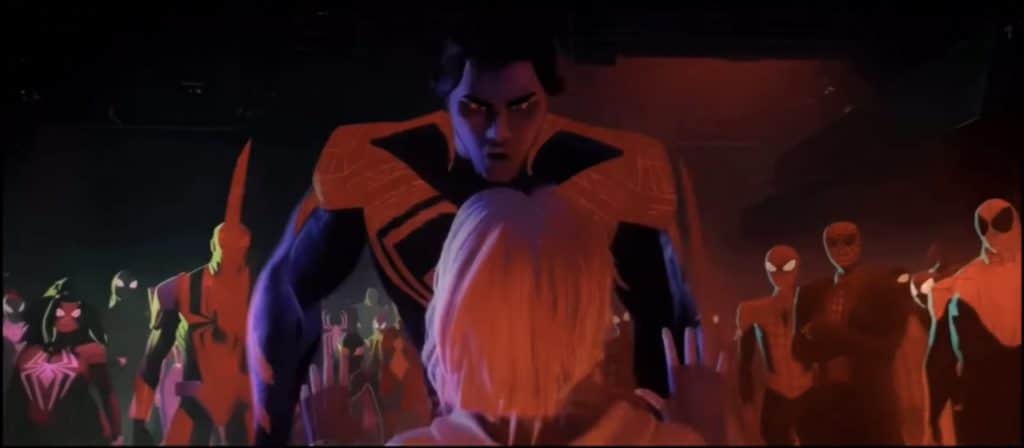
So Gwen dies, and in dying is returned to the real world – and yet, in this strange and twisted Hero’s Journey, this proves to be one of the most meaningful subversions yet.
Refusal of the Call
In the Departure stage of the monomyth, a very typical element is the Refusal of the Call – a moment when the hero is reluctant, unwilling, even resistant to being swept up into the story. The hero would rather stay in comfort and security than face the unknown, and so must be encouraged or even forced to step into danger. This, of course, underlines the great heroism the hero will then demonstrate through the story, and also serves to create value in the hero’s ordinary world – if the hero cares about their world, we will care about it as well.
Now, Gwen never refused the call – she was desperate to hop in to the portal, to leave her world behind. But in doing so, and triggering her topsy-turvy hero’s journey, she also turned her back on an actual challenge, she ran away from her real hero’s call – the confrontation with her father. This entire film has been a giant Refusal of the Call on Gwen’s part – and now, she’s finally being forced to accept it.
This might all sound terribly dissatisfying, but I think it really works, and really helps to sell Gwen’s personal journey and growth. Further, while the subverted hero’s journey that Gwen has been on may not have been ‘real’, it has nonetheless forced her to confront her own personal demons. Gwen has suffered consequences that she did not intend, and has learnt from her mistakes.
Further, Gwen has never lost sight of her larger goal – she truly does wish to be a hero. She may not have been heroic in fleeing from her father, and in failing to question Miguel, and in concealing the truth from Miles, but that does not mean that she is not striving to be a hero. But it is only now that Gwen can realise her insufficiencies, and confront her own inner demons – and in doing so, she can finally live up to the hero she wants to be. For while Gwen initially chased after the veneer of adventure and heroism by joining the Spider-Society, she has now finally confronted her own dragon, and accepted the call of her own much more domestic adventure. But the domesticity of it does not lessen the heroism Gwen finally shows in reaching out to her father, in becoming vulnerable with him.
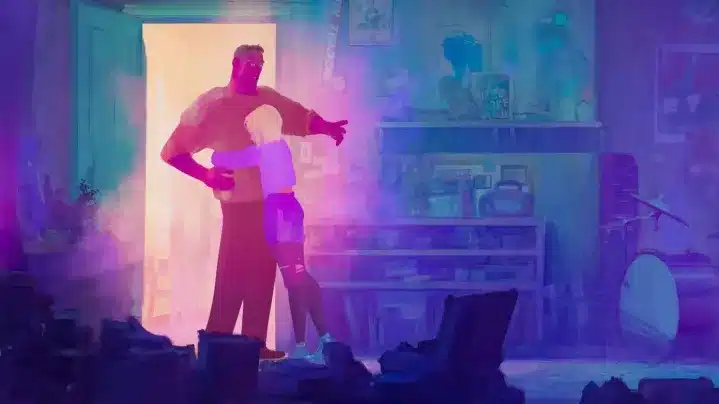
And through her reconciliation with George, Gwen is also finally able to understand why she herself has failed to live up to her heroic potential – and in doing so, is able to renew her heroic commitment with a greater clarity. At long last, Gwen is able to confront her greatest challenge – her own inadequacies.
Gwen: You’re a good cop, Dad. You know, you put on that badge because you know if you don’t, someone who shouldn’t will. But you have to understand, this mask is my badge. And I’m trying to be good, too. I was trying so hard to wear this thing the way you would want. And I didn’t. I didn’t. I can do all these things, but I can’t help the people I love the most.
Despite her twisty, subversive hero’s journey, Gwen has nonetheless grown, has achieved mastery within and without. It has taken the entire film for her to Accept the Call, but in the process, she has nonetheless discovered the internal strength to not only accept, but to excel. Gwen’s reconciliation with her father is the catharsis Gwen herself needed to realise her heroic calling, and to not only gain the strength to realise that calling, but to also gain the wisdom that being a hero isn’t simply about swinging around and saving people. It’s about confronting your own fears and demons, and overcoming them – and her newfound relationship with her father is proof that this heroic philosophy bears fruit.
Master of the Two Worlds
And in a final and fitting twist, this revelation on Gwen’s part is accompanied by her fulfilling the final stage of her monomythic journey. Gwen is resurrected through Hobie’s gift (a gift that she could not receive until she met her father – and Hobie knows that Gwen has not been home for months), and is granted mastery over her ‘ordinary’ world, and over the supernatural world that is the multiverse. Gwen has, at long last, realised her heroic sacrifice, and is granted a heroic boon as a reward. Through her self-actualisation, Gwen is at long last able to wander between the natural and the supernatural world at will, bestowing her own gifts and boons upon others.
At the end of the film, Gwen has become Miguel as he should have been, a captain of willing followers rather than a director of minions. She has also become her father, worthy of the badge that he wore and to which she aspires. And, of course, she has overcome the selfishness and fear that caused her to let down Miles – and before him, her best friend.
Gwen: I always wanted to be in a band. I guess I never just found the right one. In this line of work, you always wind up a solo act. Before Miles, there was Peter.
Come the end of AtSV, Gwen has overcome her failings, has failed and suffered and triumphed, and is bettered as a result – she is a solo act no longer. And her overcoming of these failings has been through a compelling hero’s journey – not a classic one, perhaps, but I think that works to the advantage of the film as a whole, and her own story.
I’ve gotta confess, I don’t necessarily ascribe to all of Campbell’s theories and concepts – there’s a lot of psychology and pseudopsychology in The Hero with a Thousand Faces that I don’t find compelling, and the very idea of a ‘monomyth’ is (I think) so overly broad as to be either inaccurate or unhelpful (Bonini’s paradox is at full effect here).
On the other hand, though, Campbell’s monomyth both clearly has merit, and has (more importantly) been highly influential. It is, perhaps, a chicken and egg scenario in AtSV – does Gwen’s journey mirror and subvert the hero’s journey so carefully because of the monomyth, or because the screenwriters and directors are keenly aware of the monomyth? My inclination is toward the latter, given how straight the monomyth structure is in ItSV. AtSV is thus a deconstruction and reconstruction of the monomyth, through Gwen Stacy as the hero. It’s a very clever reworking of a classic and well-known structure, making it fresh and inventive whilst staying true to the core of Campbell’s theories.
There’s a delightfully unironic tendency in Hollywood to describe any and every sequel to a moderately successful film as being ‘the Empire Strikes Back of the franchise’. But in this case, I do genuinely think there’s a good claim to that parallel with AtSV. Both are sequels to a very classic Campbellian story. Both are more disquieting, less morally clear, and end with a genuine cliffhanger whilst feeling like compelling and satisfying stories in their own right. And both of them interrogate that monomythic structure in a genuinely novel and narratively logical manner.
I’ve also seen some criticism and dissatisfaction with the character of Gwen in AtSV, which I think rather misses the point of her story. Gwen’s on a different (though convergent) journey to Miles, and needs to have those self-inflicted setbacks and losses in order to better herself, in order to realise her heroic potential. I honestly think her arc and development through the film might be my favourite element of the story, and considering how much I liked the film, that is high praise! The film is laser-focused on showing how and why Gwen grows beyond her initial flaws, and uses this twisted and reworked version of the hero’s journey to support that development. And, by the end of the film, Gwen is a genuinely matured character – just as Miles did in the first film, she has achieved her heroic aspirations, and in overcoming her flaws, has been rewarded.
Gwen: I never found the right band to join. So I started my own. With a few old friends. You want in?
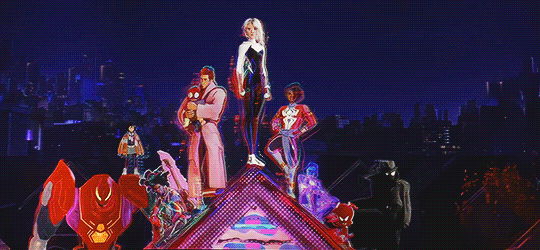
~~~~~~~~~~~~~
Thanks for reading – feel free to check out anything else you may be interested in on the blog, there’s plenty more to discover! Follow me on Facebook and on Twitter to stay up to date with The Blog of Mazarbul, and if you want to join in the discussion, write a comment below or send an email. Finally, if you really enjoyed the post above, you can support the blog via Paypal, and keep The Blog of Mazarbul running. Thanks for reading, and may your beards never grow thin!
